Why are China and India so interested in the Maldives?
Power balance between the two Asian giants may be about to shift

The Maldives, long a popular tourist destination, has grown in strategic importance in recent years as China and India vie for influence in the region, and as Beijing pushes ahead with its global trade and infrastructure plan.
Spread over nearly 1,200 islands spanning more than 90,000 sq km, key shipping lanes – where Beijing and New Delhi compete to pursue their often conflicting maritime strategies – pass through this tiny Indian Ocean nation.

Why do China and India compete over this tiny resort nation?
For years the Maldives – a country of around 400,000 people – has been in the sphere of Indian political influence. Beijing has stepped up its engagement in the country in recent years, seeing it as a key part of the investment route along its “Belt and Road Initiative”.